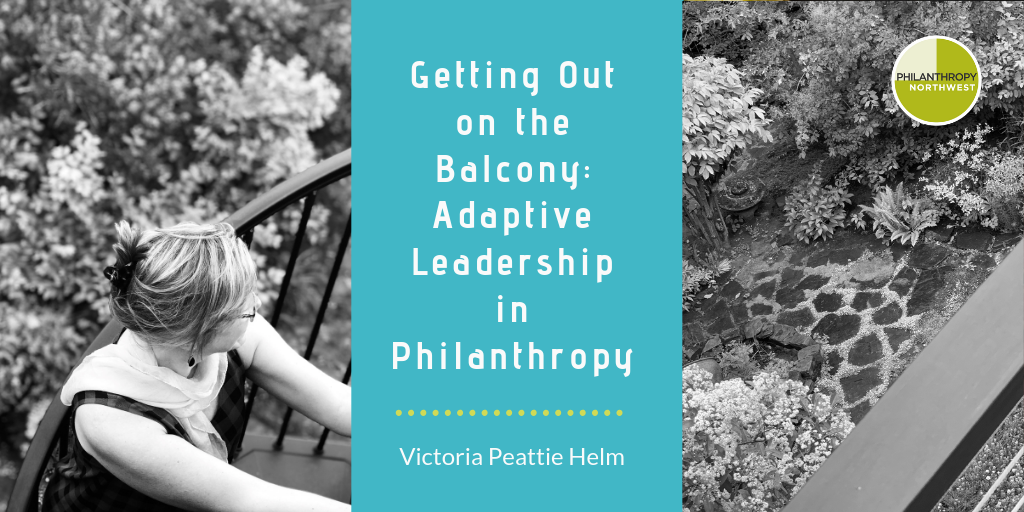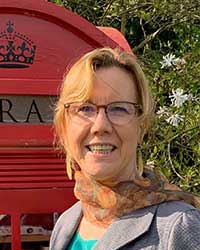
Leadership. Whole shelves are devoted to the topic at bookstores, and seminars on leadership abound. After 14 years as executive director at NW Children’s Foundation, I was eager to find ways to deepen my own leadership but could not find anything that seemed to fit. Then I discovered Philanthropy Northwest’s Women’s Leadership Cohort.
Philanthropy Northwest developed this cohort to give women leading foundations a chance to connect deeply, to learn together and from each other. I was fortunate enough to participate in this year's cohort as one of seven women executive directors* working with The Giving Practice to develop personally and professionally.
Adaptive Challenges and Stepping Out on the Balcony
As a learning cohort, we covered a lot of ground but my biggest "aha" came from digging into the adaptive leadership tools and skills, based on the work of Heifetz, Grashow and Linsky's The Practice of Adaptive Leadership, Tools and Tactics for Changing Your Organization and the World. While a technical challenge is a problem with a fix as simple as a new database or an updated set of by-laws -- an adaptive challenge is a problem that has no ready solution because it rises from changing environments or new circumstances – and it requires us to change and adapt. These problems tend to involve our beliefs, habits, fears and mental models that we hold close but rarely examine. A great deal of what we face in philanthropy are adaptive challenges! (Our DEI work and trust-based philanthropy come immediately to mind.)
We spent time identifying our own adaptive issues - those vexing problems that keep us up at night. A repeated clash with a difficult board member? A beloved colleague who is no longer productive? A feeling of being overwhelmed with no clear path forward?
Once we identified the issue that hooked us emotionally, we took turns presenting our own case to the team. We learned “peer consult” techniques that helped us to ask questions of each other that uncovered the presenter's tightly held interpretation of her own story. How would the other players in the problem describe the situation? How had the presenter contributed to the problem? What were the hidden agendas in the case? While at times uncomfortable for the presenter, these questions helped her get above the problem and gain a broader view, by "getting on the balcony." When we can get some altitude and look down on a situation, we see it in new ways.
Curiosity Creates Breakthroughs
Getting on the balcony removes us from the equation, making it less personal. The fuller picture gives us more information and possibilities. Getting curious and embracing a new perspective creates an opportunity to shift our mindset, enabling us to better adapt to a critical change facing our organizations or our environments.
As leaders encountering unchartered territory, we must be willing to disrupt the status quo by getting curious about what really stands in our way. We need to ask those questions out loud: Why have we always done things this way? What fears underlie the resistance to change? Whose voices aren't being heard? What shifts in perception, habits and power need to happen so we can grow and evolve?
Adaptive Challenges in Foundations
NW Children's Foundation faced an adaptive challenge some years ago as we struggled internally with how to grow our impact in reducing childhood trauma. For decades our philanthropy focused on making grants to support agencies serving children and families. Then we unexpectedly experienced a surge in demand for our educational forums on healing childhood trauma from hundreds of agencies as well as teachers, parents, first responders and other sectors of our community. We suddenly found ourselves at board meetings wrestling with existential questions, such as whether we were staying true to our mission or being sidetracked by devoting resources away from our traditional model of grantmaking to individual agencies.
We began to feel an organizational shift when we asked ourselves questions like: What do we fear we will lose if we grow our role as convener and educator? and How will this change our organizational culture? We began to understand that as a foundation we had social capital as well as financial resources to invest. Ending childhood trauma cannot be accomplished by one organization alone; it requires a coordinated effort and information sharing among different sectors. Our forums bring stakeholders together to learn about important issues in child welfare and encourages critical conversations and collaborations. Today our foundation is stronger and far better able to serve our community in our dual function as grantmaker and convener. We’ve adapted and evolved.
For me, as executive director, the months we spent debating (as well as avoiding discussing) these issues felt like a strenuous game of tug of war – with lots of tumbling and stumbling. I worried that I was not up to snuff as a leader with ready solutions and a plan for an easy path forward. I’m now equipped with the tools to understand that what we were facing was an adaptive challenge – and the confidence to know that the messiness was a necessary part of the process of our foundation’s evolution.
Gain Perspective from the Balcony
As leaders, we usually have the answers to questions and problems, and know where to turn if we don't. We work hard and are decisive and action-oriented. Sometimes, when change is required but the solution is not readily apparent, we should pause, take a breath and step out onto the balcony. From there we will be better able to see the bigger picture so that we have the courage to ask difficult questions, spot an opening for a new direction and find a way forward.
Acknowledgments

This article is dedicated to my colleagues Lori Mueller, Kelly Reimer and the hardworking NWCF board members who have helped me see the view from the balcony time after time.
*Special thanks to my wonderful cohort team: Karen Bilowith (Idaho Community Foundation), Kelly Bruggeman (First Interstate BancSystem Foundation), Neiri Carrasco (United Way of Central Washington), Erika Nesholm (Nesholm Foundation), Sarah Walczyk (Satterberg Foundation), Kendra Witt-Doyle (Blue Cross of Idaho Foundation for Health). We were lucky to have had the support and guidance of our leads Lisa Fisher (The Giving Practice) and Lyn Hunter (Philanthropy Northwest).
Victoria Peattie Helm is the executive director at NW Children’s Foundation. From June 2018 to March 2019, Victoria and seven other women executives met monthly as part of Philanthropy Northwest’s Women’s Leadership Cohort, facilitated by The Giving Practice. To find out more about joining a women’s leadership cohort, contact Nancy Sanabria, the director of learning strategies.


